In this blog post, I will show you how to configure the startup page, home page, and new tab page in Microsoft Edge using Intune. We will walk through creating an Intune Settings Catalog profile for Microsoft Edge, configuring the relevant browser policies, assigning the policy to devices, and validating the behavior both in Intune and directly in Edge.
By the end of this guide, you will be able to enforce corporate start pages such as SharePoint or an intranet portal while still allowing users to add their own startup sites alongside your mandatory URLs. You will also be able to configure the site used for the Home button in Edge, as well as the site that opens on the New Tab page.
Edge is tightly integrated with Microsoft 365 and Entra ID, which improves authentication, conditional access evaluations, and device compliance checks. Configure Edge as a default browser in your organization by using an Intune Settings Catalog policy. For more details, refer to the post Configure Edge as Default Browser Using Intune.
Contents
How Edge Startup, Home Page, and New Tab Settings Work
For Intune-managed devices, you can use Microsoft Edge ADMX templates or Settings Catalog policy settings to configure the Startup page, Home Page, and New Tab Page in the Edge browser. I prefer using the Settings Catalog because it eliminates the need to manage ADMX templates separately. Settings Catalog provides all available settings in one place, without requiring you to import ADMX templates into Intune. Overall, I will configure the below settings:
- Action to take on Microsoft Edge startup.
- Configure the home page URL.
- Configure the new tab page URL.
- Set the new tab page as the home page.
- Show Home button on toolbar.
- Sites to open when the browser starts.
- Sites to open when the browser starts (Device).
An important point to note is that these are device-scoped settings. Once applied, they affect all users who sign in to that device. There are corresponding user-based settings available in the Settings Catalog as well. If you do not want the policy to apply at the device level, you can use the user-based settings instead. User-based settings are identified by “(User)” at the end of the policy setting name.
Edge Startup Page/Home Page/New Tab Page Intune Policy
Let’s create an Intune policy to configure Startup page, home page, and new tab page in Microsoft Edge.
- Sign in to the Intune Admin Center > Devices > Configuration > + Create > New Policy.
- Select Platform type as Windows 10 and later. Select Profile type as Settings Catalog.
- Click on Create.
- On the Basics tab, provide a name and description of the policy. Click Next.
- On the Configuration settings tab, click + Add settings. In the Settings picker, search for
startup. click on Microsoft Edge\Startup, home page and new tab page category.
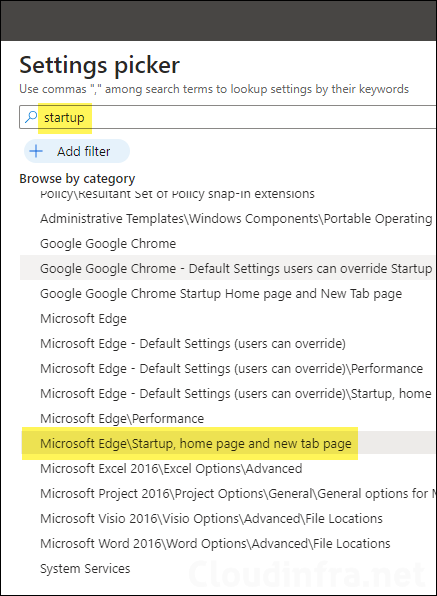
- Select below settings:
- Action to take on Microsoft Edge startup
- Configure the home page URL
- Configure the new tab page URL
- Set the new tab page as the home page
- Show Home button on toolbar
- Sites to open when the browser starts
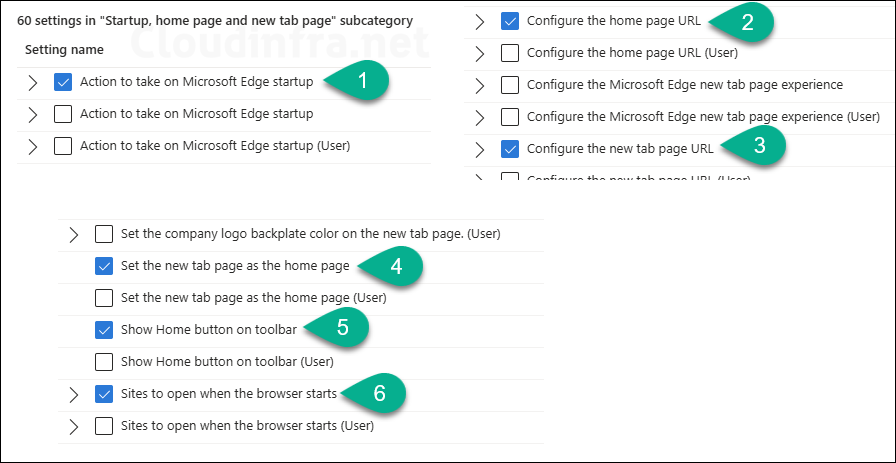
- Action to take on startup: Specifies what Edge does when it starts (for example, open a new tab, restore the last session, or open a list of URLs or open a list of URLs and restore the last session).
- Configure the home page URL: Sets the URL that Edge uses when users click the Home button.
- Configure the new tab page URL: Overrides the default Microsoft Start / MSN new tab page with a custom URL.
- Set the new tab page as the home page: By default, the Home button is configured to open the New Tab page instead of the URL you specify. Setting this option to Disabled ensures that the Home button uses the URL defined in the HomepageLocation setting. (In below screenshot, it’s https://www.microsoft.com).
- Show Home button on toolbar: Controls whether the Home button is visible on the Edge toolbar.
- Sites to open when browser starts: Defines the list of startup URLs at the device scope so that all users on the device get the same set of pages when Edge starts.
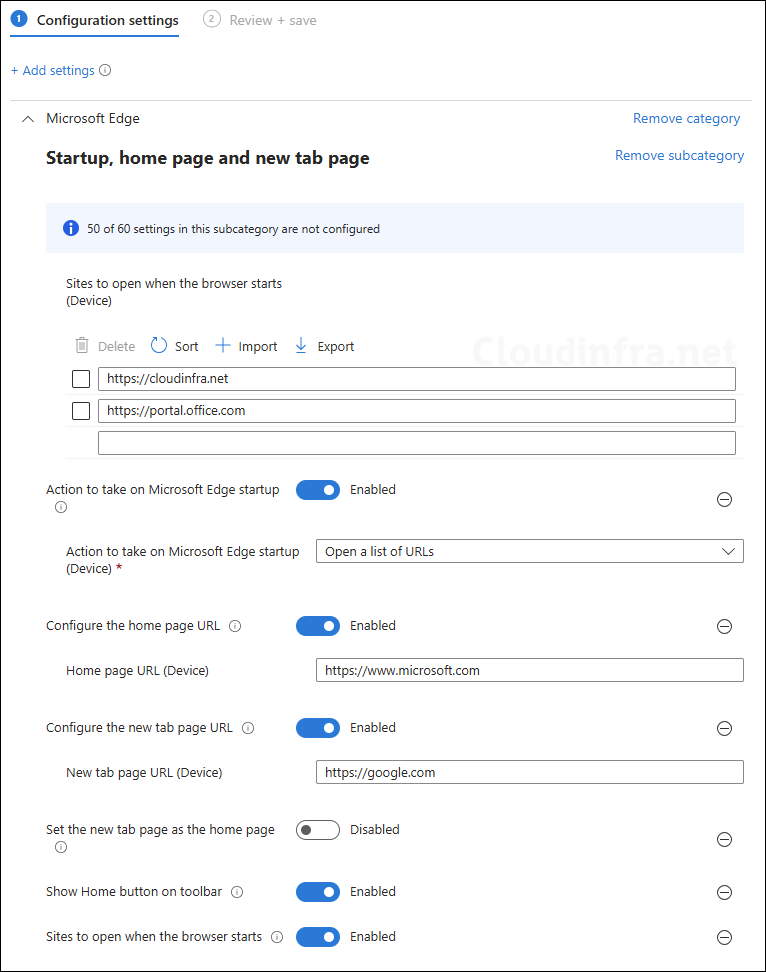
- Scope tags (optional): A scope tag in Intune is an RBAC label you add to resources (policies, apps, devices) to limit which admins can see and manage them. For more information, read How to use Scope tags in Intune.
- Assignments: Assign the policy to Entra security groups that contain the target users or devices. As a best practice, pilot with a small set first; once validated, roll it out more broadly. For guidance on assignment strategy, see Intune assignments: User groups vs. Device groups.
- Review + create: Review the deployment summary and click Create.
Optional: Allow users to add their startup pages
By default, when you configure RestoreOnStartup = 4 (Open a list of URLs) together with RestoreOnStartupURLs (Sites to open when the browser starts), Edge treats the list as fully managed. This means users cannot add their startup pages. For example, if a user tries to add a site to the Startup list by clicking Add site, the browser will not save the entry because the list is enforced by policy.
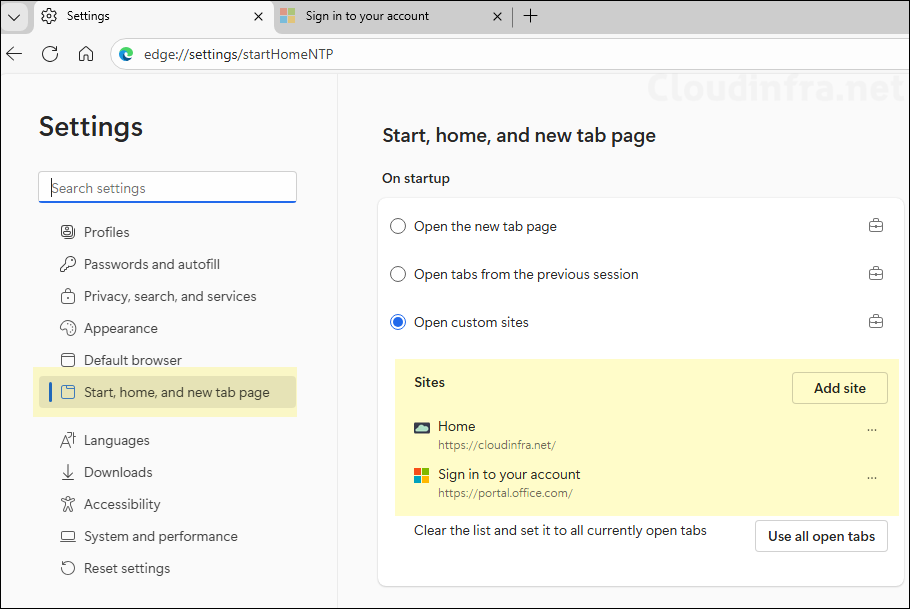
If you want to enforce your URLs and still allow users to add extra startup sites, enable the setting Allow users to add and remove their own sites during startup when the RestoreOnStartupURLs policy is configured (RestoreOnStartupUserURLsEnabled).
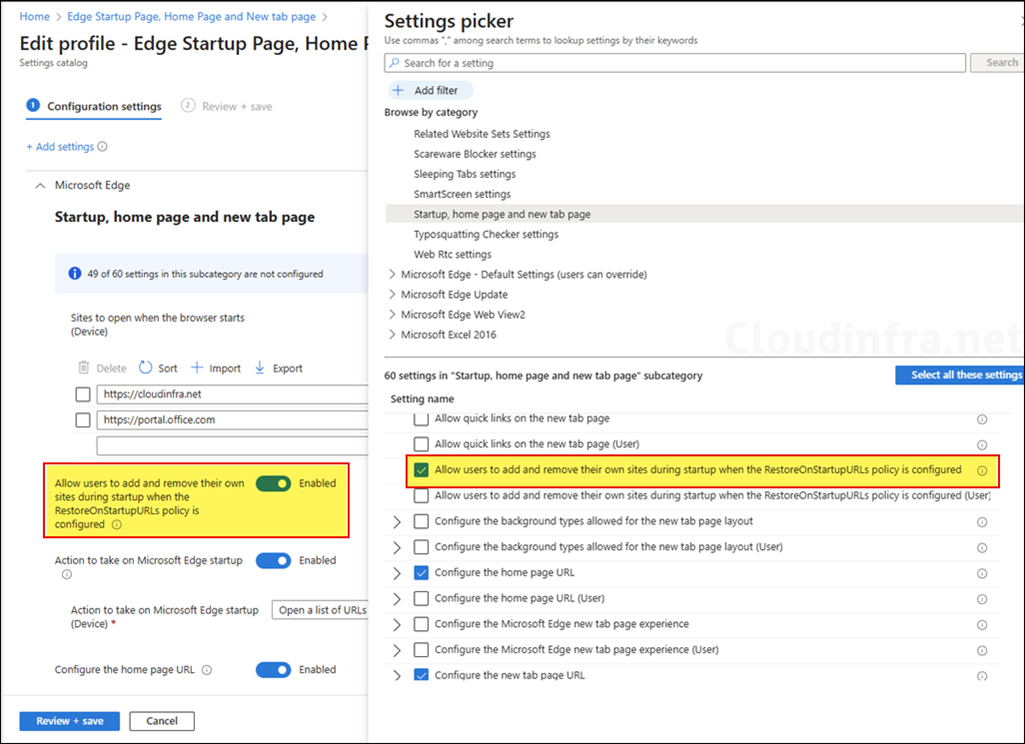
Sync Intune Policies
The device check-in process might not begin immediately. If you’re testing this policy on a test device, you can manually kickstart Intune sync from the device itself or remotely through the Intune admin center.
Alternatively, you can use PowerShell to force the Intune sync on Windows devices. Restarting the device is another way to trigger the Intune device check-in process.
End User Experience
Once the policy is deployed on the target devices, sign in to one of the devices to check and confirm if its working successfully.
- Launch the Microsoft Edge browser.
- At startup, the browser opens the list of URLs you configured in Sites to open when the browser starts.
- Clicking the Home button navigates to the URL configured in Configure the home page URL.
- Opening a new tab loads the URL configured in Configure the new tab page URL.
- You should be able to add a site to the Startup Sites list if you have enabled the RestoreOnStartupUserURLsEnabled policy setting.
To verify that the policies are applied, users or administrators can:
- Open Edge and type
edge://policyin the address bar. - Confirm that the following policies are present and set as expected:
- HomepageIsNewTabPage
- HomepageLocation
- NewTabPageLocation
- RestoreOnStartup
- RestoreOnStartupURLs
- RestoreOnStartupUserURLsEnabled
- ShowHomeButton
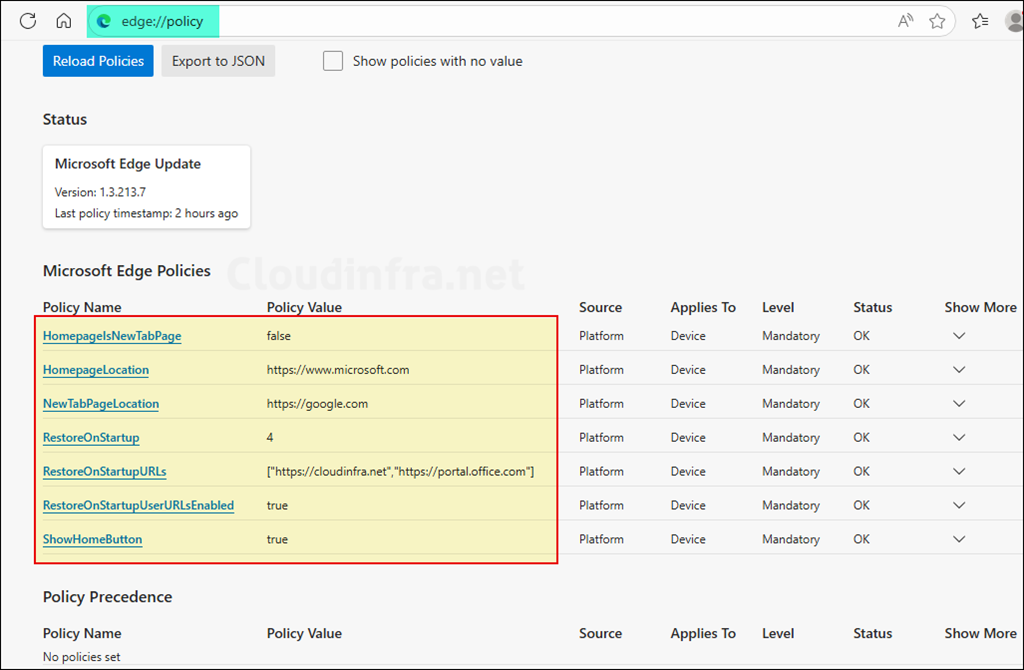
Confirm Edge Policy Deployment using Event Viewer
You can also use Event Viewer to confirm that the Microsoft Edge policy settings were delivered to the device via Intune.
- Open Start > Event Viewer. Navigate to Applications and Services Logs > Microsoft > Windows > DeviceManagement-Enterprise-Diagnostics-Provider > Admin.
- Filter or search for Event ID 814. In the event details, look for entries where the policy name references microsoft_edge~Policy~microsoft_edge~Startup or similar. Event ID 814 indicates that a policy from Intune has been applied and shows the values written by the MDM client.
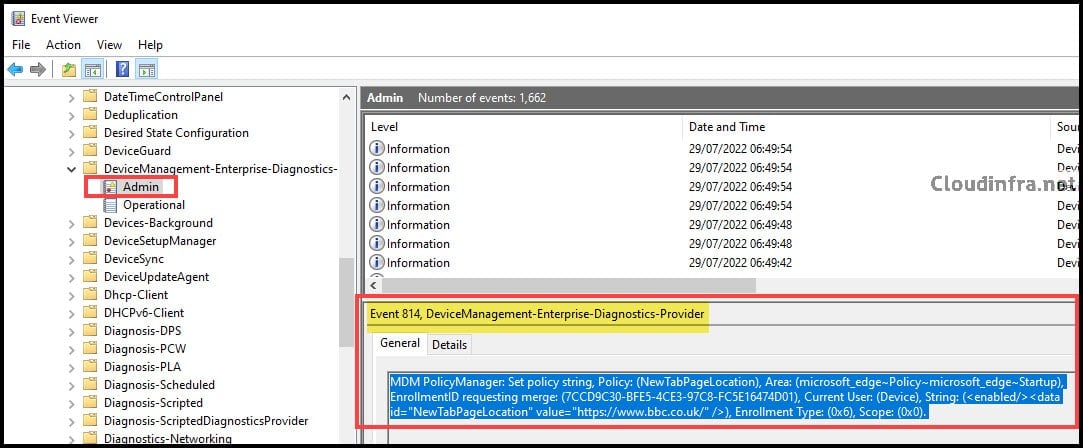
Confirm Intune Edge Settings Deployment using Registry
You can also check the registry to see the Edge startup and home page policy entries:
- Press Windows + R, type
regedit, and press Enter. - Navigate to the below registry path. Replace
<ProviderGUID>with the actual GUID you see under Providers on your device.
HKEY_LOCAL_MACHINE\SOFTWARE\Microsoft\PolicyManager\Providers\<provider GUID>\default\Device\microsoft_edge~Policy~microsoft_edge~Startup
- On the right-hand side, you should see values corresponding to the settings you configured. The exact value names are generated by the PolicyManager engine, but the key path confirms that the Intune Edge startup policy has been delivered to the device.
- HomepageIsNewTabPage
- HomepageLocation
- NewTabPageLocation
- RestoreOnStartup
- RestoreOnStartupURLs
- RestoreOnStartupUserURLsEnabled
- ShowHomeButton

Other useful Edge startup, home page, and new tab settings
Under Microsoft Edge\Startup, home page and new tab page in Settings Catalog, there are many additional settings you may want to explore. You can combine these to give users a clean, branded new tab page experience with or without news, quick links, company logos, and so on, depending on your requirements.
| Policy setting | Description |
|---|---|
| Action to take on Microsoft Edge startup | Defines what Edge does at startup, for example, open a new tab, restore last session, or open a list of URLs. |
| Action to take on Microsoft Edge startup | Same as above; device-scoped variant exposed in Settings Catalog. |
| Action to take on Microsoft Edge startup (User) | User-scoped version that sets the default startup behavior for the signed-in user. |
| Action to take on Microsoft Edge startup (User) | Same as above; user-scoped variant exposed in Settings Catalog. |
| Allow Microsoft content on the new tab page | Allows or blocks Microsoft news and content feed on the enterprise new tab page. |
| Allow Microsoft content on the new tab page (User) | User-scoped version that lets you allow or block Microsoft content per user profile. |
| Allow quick links on the new tab page | Controls whether quick link tiles (site shortcuts) are shown on the new tab page. |
| Allow quick links on the new tab page (User) | User-scoped version that controls visibility of quick links per user profile. |
| Allow users to add and remove their own sites during startup when the RestoreOnStartupURLs policy is configured | Lets users add and remove their own startup pages in addition to the admin configured URLs. |
| Allow users to add and remove their own sites during startup when the RestoreOnStartupURLs policy is configured (User) | User-scoped version that lets individual users manage extra startup pages alongside the managed list. |
| Configure the background types allowed for the new tab page layout | Restricts which background types (image, solid colour, custom) users can select on the new tab page. |
| Configure the background types allowed for the new tab page layout (User) | User-scoped version that controls allowed new tab page backgrounds per user. |
| Configure the home page URL | Sets the URL that the Home button opens when clicked. |
| Configure the home page URL (User) | User-scoped version that sets the default home page URL for the user. |
| Configure the Microsoft Edge new tab page experience | Chooses the overall new tab experience, such as Microsoft Start, Office, or a custom layout. |
| Configure the Microsoft Edge new tab page experience (User) | User-scoped version that defines the new tab experience for the user. |
| Configure the new tab page URL | Sets a specific URL to open whenever a new tab is created. |
| Configure the new tab page URL (User) | User-scoped version that defines the default new tab URL for the user. |
| Disable Bing chat entry-points on Microsoft Edge Enterprise new tab page | Hides Bing Chat icons and entry points on the enterprise new tab page. |
| Disable Bing chat entry-points on Microsoft Edge Enterprise new tab page (User) | User-scoped version that hides Bing Chat entry points per user profile. |
| Enable preload of the new tab page for faster rendering | Preloads new tab content in the background to make opening a new tab faster. |
| Enable preload of the new tab page for faster rendering (User) | User-scoped version that controls new tab preloading per user. |
| Hide App Launcher on Microsoft Edge new tab page | Hides the Microsoft 365 app launcher icon on the new tab page. |
| Hide App Launcher on Microsoft Edge new tab page (User) | User-scoped version that hides the app launcher per user. |
| Hide the company logo on the Microsoft Edge new tab page | Hides the organisation logo from the enterprise new tab header. |
| Hide the company logo on the Microsoft Edge new tab page (User) | User-scoped version that hides the organisation logo per user. |
| Hide the default top sites from the new tab page | Hides default Microsoft top sites from the new tab quick links area. |
| Hide the default top sites from the new tab page (User) | User-scoped version that hides default top sites per user. |
| Set new tab page company logo (deprecated) | Legacy setting to define a company logo image on the new tab page; replaced by newer branding options. |
| Set new tab page company logo (deprecated) (User) | User-scoped legacy version of the new tab page company logo setting. |
| Set new tab page quick links | Defines a managed set of quick link tiles that appear on the new tab page. |
| Set new tab page quick links (User) | User-scoped version that sets default quick links for the user. |
| Set the company logo backplate color on the new tab page. | Sets the background colour behind the company logo on the new tab header. |
| Set the company logo backplate color on the new tab page. (User) | User-scoped version that sets the logo backplate colour per user. |
| Set the new tab page as the home page | Forces the Home button to open the new tab page instead of a separate home page URL. |
| Set the new tab page as the home page (User) | User-scoped version that ties the Home button to the new tab page for that user. |
| Show Home button on toolbar | Shows or hides the Home button on the Edge toolbar. |
| Show Home button on toolbar (User) | User-scoped version that controls the Home button visibility for the user. |
| Sites to open when the browser starts | Defines the list of URLs that Edge opens on startup when configured to open a set of pages. |
| Sites to open when the browser starts (User) | User-scoped version that defines startup URLs for the user when “open a set of pages” is selected. |
Conclusion
In this post, we configured Microsoft Edge’s startup page, home page, and new tab page for Windows 10 and Windows 11 devices using Intune’s Settings catalog. We also covered how to optionally allow users to add their own startup pages on top of your mandatory list and how to verify policy delivery using Edge, Event Viewer, and the registry.

This works great for our users but it won’t allow them to add additional pages to launch on startup. We always want the homepage to launch on startup as well as a new tab. But it seems this configuration wont allow users to add additional sites which they’d like to do. Have you seen this work before? Thakns for the great article!